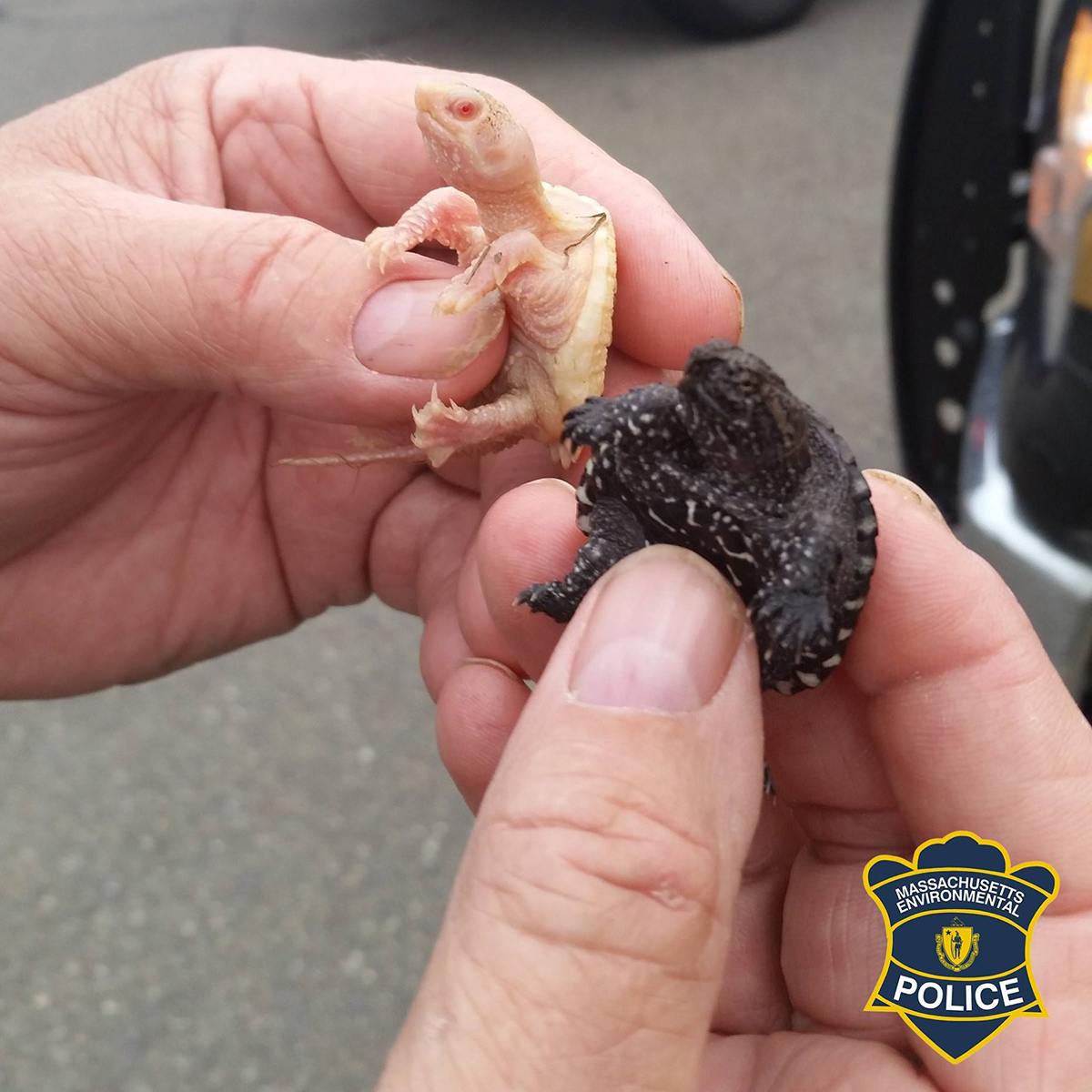Lucky Rescue for a Rare Albino Snapping Turtle and Its Buddy

Photo via Massachusetts Environmental Police
Looking like Yin and Yang, but in shells, a pair of baby snapping turtles—one all white, the other nearly all black—are getting their 15 minutes of fame and a safe place to call home this week after they were discovered in a Lakeville pool, the Globe reports.
A Massachusetts Environmental Police lieutenant came across the two little hatchlings on Wednesday after a homeowner found them inside a pool filtration system. The agency estimates they were two days old. One is a rare albino, meaning it lacks melanin, and the other has an unusually dark coloration—though it isn’t melanistic, as the MEP thought, which would have made it essentially the opposite of an albino, and also very uncommon.
The all-white reptile is certainly a rare find, even in a region that’s crawling with snapping turtles and other lake-dwelling species, according to Wilton F. Gray, the MEP lieutenant who collected the reptiles. In an interview with Boston, he says he was astonished when he first saw it.
“That’s one in a million,” says Gray, who also lives in Lakeville and is a friend of the family that spotted the reptiles (the family has asked for privacy).
Countless snapping turtles hatch every year near Gray’s home, traversing from body of water to body of water, dodging egrets and other foes, and toughing it out in search of food before winter comes. Most die before they reach adulthood, and getting caught in a pool could have been the end of the line for these two.
“It was fortunate,” Gray says. “You wouldn’t think that would be the best place for them to end up, but in this case it was.”
On Thursday morning, Gray traveled up to Beverly and delivered the quarter-sized friends to Michael Ralbovsky, a longtime herpetologist (one who studies amphibians, reptiles, etc.) with Rainforest Reptile Shows, Inc., who was more than happy to see an albino spared an untimely death.
“I’ve only seen two since I’ve been in Massachusetts and it’s been 24 and a half years,” Ralbovsky says. “When you have an animal like that you don’t want anything to happen to it.”
In the wild, albino turtles just don’t stand a chance. Their little white bodies stick out against their habitats’ greens and browns, and they are swiftly devoured by predators. “When you see a flash of white going through the water, an animal that’s a predator, they’re going to want to go after it,” Ralbovsky says. “He looks like the McDonald’s golden arches. It’s like a great big neon sign saying, ‘Eat me.’”
That makes them incredibly rare, and specimens sold by special breeders online can fetch thousands.
This one is safe now, though, and appears healthy, Ralbovsky says. His team of experts plan to monitor it and its companion closely, and if all goes well, show the two turtles off later this month at the Topsfield Fair. They may even invite the public to help name them. He doesn’t know whether they’re male or female yet, because you have to wait until turtles are much more mature to determine their sex.
Ralbovsky says he’s glad people are curious about the little critters in his care. It’s also good timing after what sort of felt like a lost opportunity. His educational company was recently thrust into the spotlight for another reason: they were the ones who brought alligators to the set at CBS for a now-infamous visit with Boston sports anchor Steve Burton. While that viral clip was short and of minimal educational value, the little albino turtle and its darker-toned buddy can entertain and help teach people about animals for years to come.
As for the residents of Lakeville, Ralbovsky says they should be on the lookout for more all-white turtles, because this may not be the last one roaming the neighborhood.
“There’s a snapping turtle out in the wild with a recessive gene,” he says. “It may have been producing albino babies for years and years and we never knew it.”


